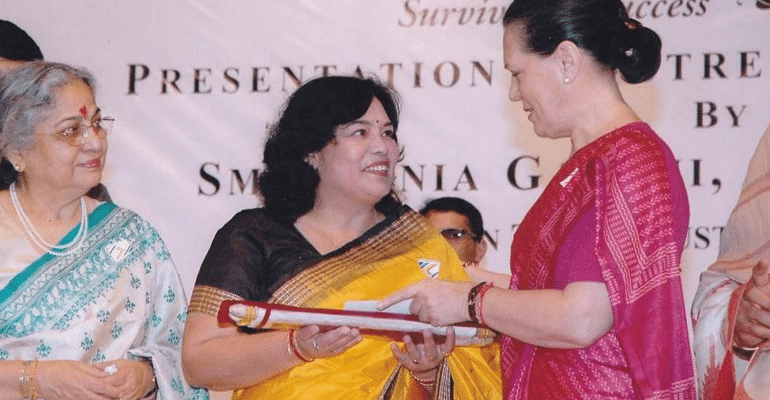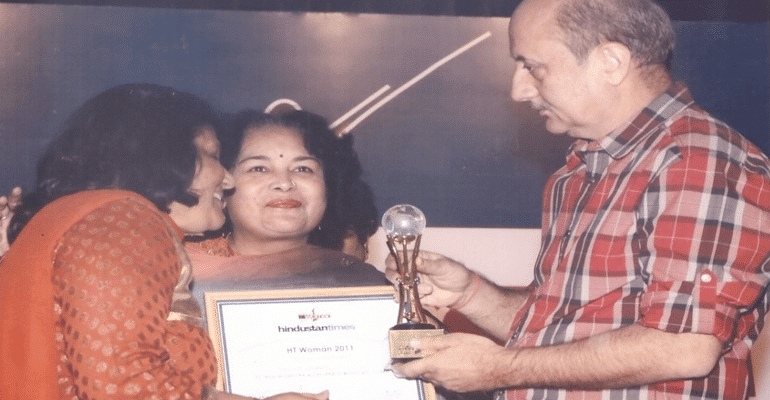She prepared 400 Braille books covering the UP Board syllabus from 9th to 12th class for blind children with the help of a manual brailler. Recorded over 400 audio cassettes covering the same syllabus and helped the blind students of that school to get 100% result in UP Board exams, both 10th and 12th, with some children, even receiving a distinction.
Quitting journalism to help the specially-abled children wasn’t a difficult call to make for this woman. Thus, Drishti Samajik Sansthan (DSS) was established by Neeta Bahadur in 1990, a special school for the visually impaired children.

In 2014, she lost her life to Cancer but the love she left behind for these children will be enough for infinite lifetimes to come.
In a heart-warming conversation with Life Beyond Numbers, Dhiresh Bahadur (her husband) and Atharva Bahadur (her son) share beautiful memories of Neeta, how they are taking the legacy forward, and the teachings and techniques she left behind for the welfare of specially-abled kids.
Growing up in love
A liberal upbringing helps the kids to become emotionally strong and give them the courage to fight their own battles. Neeta was certainly one of them. Raised by parents who believed in her, supported her to become a better person and help others.

Born in Uttarakhand’s Almora, Neeta got to travel a lot because of her father’s transferable job, which helped her to get a glimpse of people’s lives and their backgrounds.
Dhiresh met Neeta when they were pursuing journalism at Bhartiya Vidya Bhawan and both fell in love with each other. “We could connect easily with each other, had similar perspectives about life and therefore, we decided to take it forward. Our parents were liberal about it and so ours was a love-cum-arranged marriage,” says Dhiresh with a smile.
The way Dhiresh speaks about Drishti (the NGO), looks like it is their first child and Atharva, their second. “We stayed and worked together for a long time and when I recall those moments, it feels like divine intervention.”
Juggling between family and work, time was a challenging factor in their lives. “Because of the nature of our relationship, I got to know her as a person very closely. I have often seen guilt in her eyes of not giving our son enough time but we talked about this that it was more important to serve these children, rather than fulfilling her duties as a homemaker,” he says.
When asked about love in the time of millennials and the approaching Valentines Day, Dhiresh says, “I believe charity begins at home. Even though we all miss Neeta today but I always tell my son to become a better person and guide him when it comes to understanding relationships.”
Watch the video here:
Neeta’s Drishti
Neeta worked at esteemed media houses like Pioneer and Northern India Patrika, while Dhiresh was with All India Radio. She was in journalism for 3 years (1987-1990) and Dhiresh joined SBI as a probationary officer after marriage. Apart from being a reporter, she also liked singing and painting, but looking after specially-abled orphan children were her first priority.
“Once Neeta visited remote areas in Lucknow as a reporter and saw specially-abled children abandoned by families. This incident triggered a thousand thoughts in her mind and hence Drishti was born,” says Dhiresh.
He continues. “It was essential to devote all our time to these specially-abled children who do not have a care in the world. Neeta’s mother also helped us in the process and supported our work, she has raised Atharva to an extent we were unable to look after him. We all knew how important this work was and therefore, we evolved whenever there was a difficult situation.”
A doting wife and a loving mother- When asked about his mother, Atharva says, “My mother was a highly emotional person and she understood how much love is essential for these children. Whenever I used to come back from school, we discussed different methods to inculcate positive change in their behavior and provide effective education. I miss her so much, we all do and now my father and Shalu Singh (a friend, classmate and now the Joint Director of DSS) help me carry out her legendary vision.”
The NGO is currently running two projects- a special home and a training-cum-shelter home. It houses 250 abandoned, multiple-challenged children. Kids from about 50 nearby villages of Bakshi Ka Talab and Chinhat Blocks are brought by the NGOs own chartered buses and provided education and training, completely free of cost. Also, it now runs D Café 16, in partnership with Amul, India, where specially-abled orphan kids learn business skills to support themselves.
Service before self
Experts divide the types of cognitive impairment into four categories: mild intellectual disability, moderate intellectual disability, severe intellectual disability, and profound intellectual disability.
“There was hardly any school for special kids when Drishti was started. Neeta’s focus was always on the behavioral pattern of these specially-abled children. Usually, children belonging to severe and profound intellectual disability categories are abandoned by their families because they find it difficult to raise a child like that, but Neeta didn’t give up, rather she developed customized lesson plans based on every child’s needs,” recalls Dhiresh.

“In villages, people are skeptical about sending their children to school, especially when they are disabled. My mother wanted to change that. She used to go to villages in person and convince their parents so that no child was deprived of education,” mentions Atharva.
After her passing away, whoever volunteered to with the NGO, they were asked to apply the Neeta Bahadur technique to effectively teach these special kids. “The work we do today is a tribute to her. We are not divided by religion but united by love. These children are so efficient and are so much more than their physical disabilities. We stay like a family, help each other and grow together,” he concludes.
“Mita de apni hasti ko gar kuchh martaba chahe
Ki dana khaak mein milkar, gul-e-gulzaar hota hai”
These beautiful lines by famous philosopher and poet Allama Iqbal perfectly sum up Neeta’s great moral courage and vision. Her extraordinary and inspiring journey is an example of what one is capable of when it comes to spreading love and compassion to those in need.

